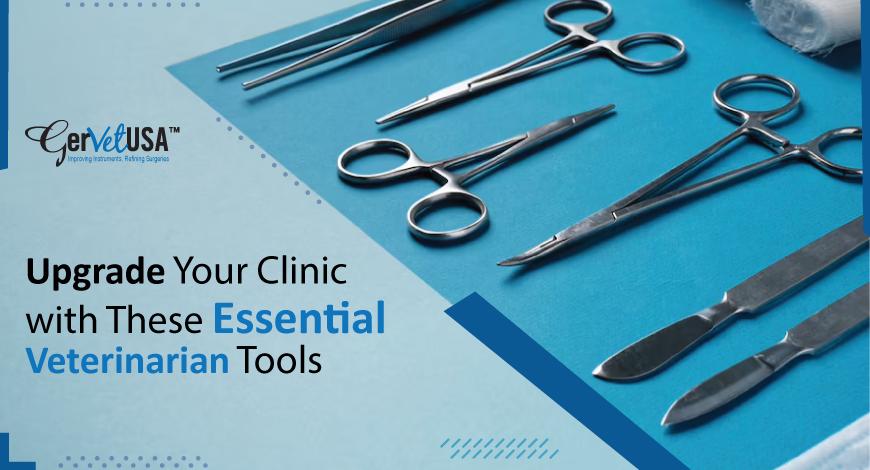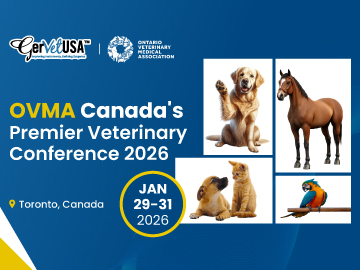A veterinary practice without the right tools is like an artist without a paintbrush. Choosing the right veterinarian tools is an investment in the care and health of your animal patients. A well-equipped approach not only ensures that you can offer a full range of services but also gives your customers the confidence that their animals are in good hands.
Remember, the key to a successful veterinary practice is a combination of expertise, compassion, and the right tools. All tools of a veterinarians are essential to restoring the animal's health, from the initial diagnosis to treatment and recovery.
Essential Veterinarian Tools For Vet Clinics
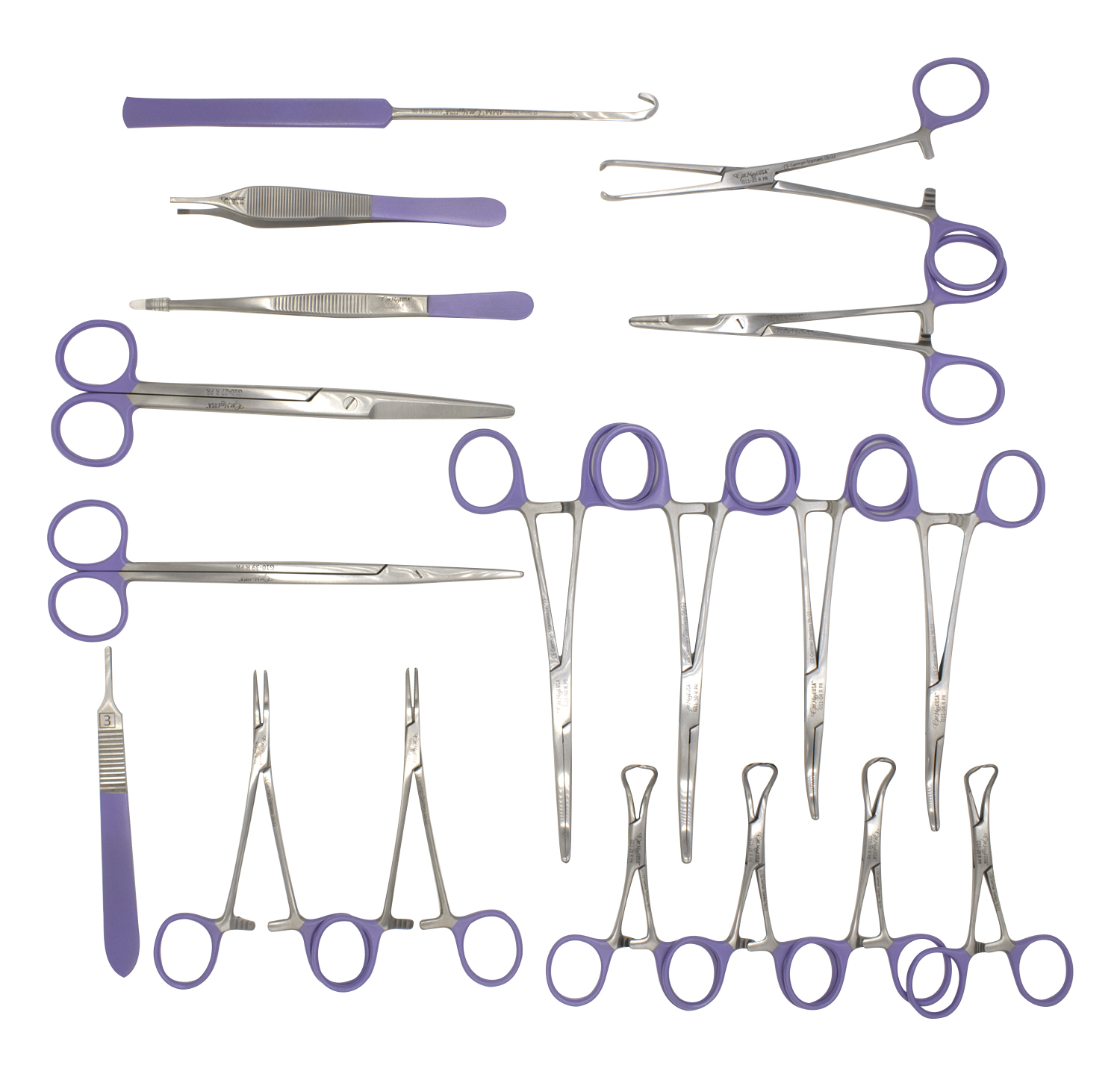
• Surgical Scissors:
These tools used by a veterinary doctor are designed for precision and in various shapes and sizes to meet different surgical needs, such as cutting tissue or making sutures.
• Forceps:
They are essential for holding and manipulating tissue during surgery. Forceps are available in different shapes and sizes for specific applications.
• Retractors:
Essential for holding tissue or organs in place while ensuring a clear field of vision during surgery. They play an essential role in opening wounds during various surgeries, so this is a must-have tool for every vet.
• Surgical Blades:
These are sharp veterinary tools used to make incisions and dissect tissues in surgeries. There are many different types of surgical blades to suit other procedures.
• Elevators:
These are mainly used in dental procedures, helping to extract the tooth by separating it from the ligament. Elevators are also helpful in removing intra-radicular bone.
• Clamps:
They compress blood vessels to prevent or stop blood flow during surgery. Clamps help grip, dissect, block, and retract.
• Probes And Directors:
Probes are used to examine wounds or body cavities, while directors are used to introduce other instruments.
• Surgical Needles:
These are used in combination with sutures to close wounds or surgical incisions. Needles allow the placement of sutures within the tissue.
• Veterinary Speculum:
They are Used to open body cavities for examination or surgery to view the surgical incision. It is one of the most essential veterinarian tools to use the speculum for vaginal exams.
• Needle Holders:
They hold a needle for suturing wounds. Needle holders ensure the fastening and accuracy of the work.
• Dissecting Scissors:
These are essential veterinarian tools that vets use to cut tissue during operations. Some scissors are perfect for cutting delicate tissues, while sharp blades are suitable for cutting dense tissue.
• Scalpels:
They are essential veterinarian tools for making clean, precise cuts and dissecting tissues. Scalpels come in a wide range of sizes, and dermatologists use them often.
• Hemostats:
These veterinary surgical instruments stop bleeding by closing blood vessels. Another use is to grip and save superficial fascia during debriding wounds. A perfect tool for revealing, discovering, and visualizing the deeper areas of a wound.
• Sutures:
The most common tools that surgeons use during surgeries are sutures. Various types of sutures are used to close wounds or incisions after surgery.
• Scalpel Handles:
They hold the scalpel blade in place during surgery. It is a robust and ergonomic tool often used in surgeries requiring accuracy control and sharp tissue cutting.
Summarized in a table about veterinary tools and their uses:
| Essential Surgical Tools | Uses |
| Surgical Scissors | Cutting tissue or sutures |
| Forceps | Holding and manipulating tissues |
| Retractors | Providing a clear field of view |
| Surgical Blades | Making incisions |
| Elevators | Used in dental procedures |
| Clamps | Stopping blood flow |
| Probes and Directors | Exploring wounds or guiding instruments |
| Surgical Needles | Closing wounds |
| Veterinary Speculum | Opening body cavities |
| Needle Holders | Holding suturing needles |
| Dissecting Scissors | Cutting and dissecting tissue |
| Scalpels | Making incisions |
| Hemostats | Controlling bleeding |
| Sutures | Closing wounds or incisions |
| Scalpel Handles | Holding the scalpel blade |
Specialized Instruments For Specific Veterinary Needs
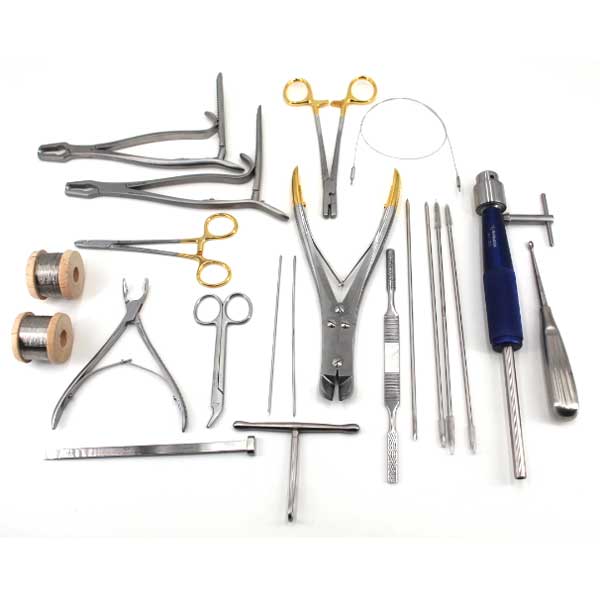
In addition to these basic instruments, a range of specialized tools meet specific veterinary needs. Although every doctor does not require these instruments, they are invaluable in certain situations.
• Microsurgical Tools
These veterinarian microsurgical instruments tools, such as micro-scissors, micro-forceps, and needle holders, perform complex procedures and guarantee precision and control.
• Ophthalmic Instrument
These instruments, such as scissors, tweezers, and other ophthalmoscopic tools, are designed for the delicate world of animal eye health.
• Orthopedic Instruments
You need special tools such as drills, wire cutters, and hammers for bone surgery.
• Dental Tool
These tools, such as scrapers, curettes, and elevators, are essential for oral hygiene procedures.
• Cardiology Tools
These cardiology instruments, such as stethoscopes, electrocardiographs, and blood pressure monitors, are needed for monitoring and treating heart health.
• Laparoscopic Instruments
These tools used in veterinary practice enable minimally invasive surgical procedures and accelerate patient recovery. They include trocars, cannulas, and laparoscopic scissors.
• Otoscopic Instruments
Otoscopes and similar instruments are essential for examining and treating ear diseases in animals.
• Dermatological Instruments
Skin diseases require special care, and instruments such as dermatoses, skin staplers, and biopsy punctures are used.
• Radiological Instruments
Veterinarian tools like X-ray, ultrasound, and MRI machines are essential for imaging needs.
• Obstetrical Instruments
These instruments, including birthing hooks and extractors, enable newborn animals to be delivered safely.
Summarized in a table
| Specialized Veterinarian Tools | Uses |
| Microsurgical Instruments | Performing intricate procedures |
| Ophthalmic Instruments | Eye health procedures |
| Orthopedic Instruments | Bone-related procedures |
| Dental Instruments | Oral health procedures |
| Cardiology Instruments | Heart health monitoring and treatment |
| Laparoscopic Instruments | Minimally invasive surgeries |
| Otoscopic Instruments | Ear examinations and treatment |
| Dermatology Instruments | Skin conditions treatment |
| Radiology Equipment | Imaging needs |
| Obstetrical Instruments | Safe delivery of newborn animals |
Every veterinarian's toolbox depends on their practice and professional needs. However, investing in high-quality, specialized tools is essential to providing the best possible care for patients, whatever their needs.
Whether it's the microscopic precision required for microsurgery or the wide range of imaging capabilities needed for radiology, these specialized tools all have their part to play. Remember, by equipping your practice with the right veterinary tools and equipment; you’re improving the quality of care and showing that you care about the health and well-being of your patients.
Choosing The Right Veterinary Medical Tools
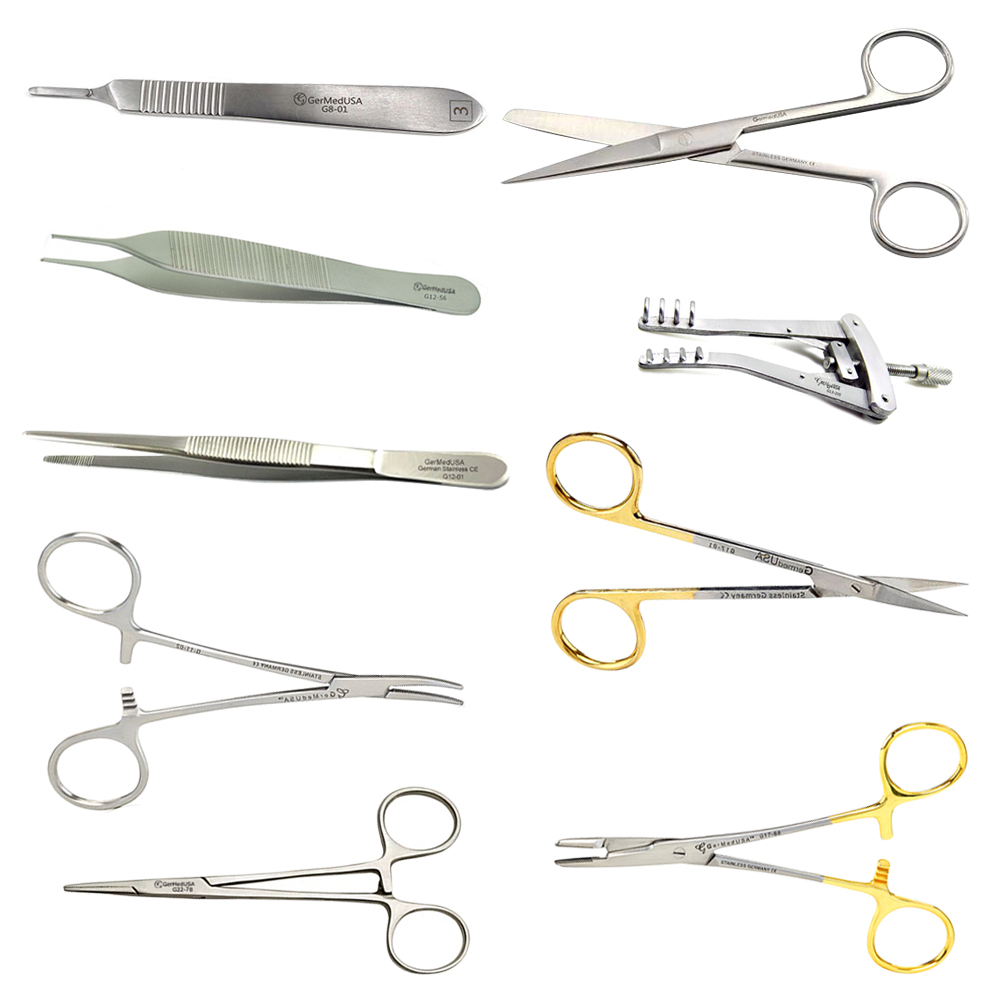
Choosing the right tools for veterinary surgery can be daunting, especially considering the wide range of options available. Here are a few tips to help you make an informed decision:
• Quality: Don't compromise on quality, even if your budget is tight. Investing in quality tools pays off in the long run, as they tend to last longer and perform better.
• User Comfort: choose tools with which you can work comfortably. Factors such as weight, balance, and grip can significantly influence your ability to perform surgery effectively.
• The Patient Needs: when choosing tools, consider the types of animals and conditions common to your practice. For example, investing in high-quality dental instruments is essential to treat many dental cases.
• Supplier Reliability: Ensure your supplier is reliable and capable of providing after-sales service. It's also essential to check whether your supplier offers an instrument warranty.
• Sterilization Procedures: choose instruments that are easy to sterilize and can withstand repeated sterilization without losing effectiveness.
| Tips for Choosing Tools | Explanation |
| Quality Over Cost | High-quality tools perform better and last longer. |
| User Comfort | Comfortable tools enable more effective procedures. |
| Patient Needs | Animal types, and common conditions should guide tool selection. |
| Vendor Reliability | Reliable suppliers can provide after-sales service and warranties. |
| Sterilization Process | Tools should be easy to sterilize and maintain efficiency. |
In Conclusion,
Veterinarian tools are varied and specialized, reflecting many animal diseases and treatments. With the right tools for specific veterinary needs, you can offer our animals effective, high-quality medical care. Equip your practice with specialized tools from GerVetUSA, and you'll be ready to take on any challenge that comes your way!
Ultimately, investing in the right equipment isn't just a business decision; it's also a sign of your commitment to the health and well-being of your animal patients. If you equip your clinic with care, you're well on your way to providing the highest quality basic veterinary tools.
Frequently Asked Questions (FAQs)
Why is it essential to update the equipment in your veterinary clinic?
Keeping veterinary clinic equipment updated is essential to ensuring the most accurate diagnoses and the best care for animals. Modern equipment delivers more detailed and faster results, increases efficiency, and helps broaden the range of services a clinic offers.
Can upgrading veterinary equipment have an impact on a clinic's business?
Absolutely. Investing in modern, state-of-the-art equipment improves animal care and makes the clinic more attractive to potential customers. It means the clinic keeps abreast of the latest developments in veterinary medicine, which can boost customer confidence and potentially increase revenues.
Is the investment in these high-quality veterinarian tools financially viable?
Although the initial investment in these instruments may seem high, they pay for themselves long-term. These veterinary surgical instruments often enable more accurate diagnoses and reduce the risk of costly medical errors. They can also improve efficiency, as more animals can be admitted and treated, boosting clinic revenues.

